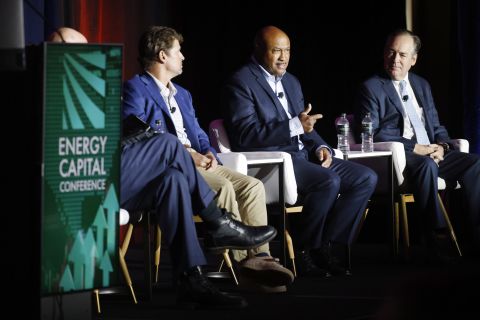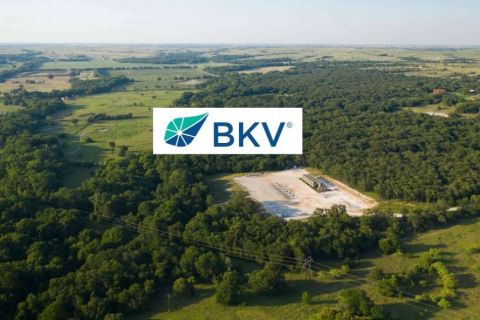
Robert L. Barnes, senior vice president for commercial crude oil at Magellan Midstream Partners LP. Source: Hart Energy
SAN ANTONIO -- Robert L. Barnes, senior vice president for commercial crude oil at Magellan Midstream Partners LP, wants to be clear what makes his Tulsa, Okla.-based company different: It’s not interested in competing with its customers.
“We’re an independent service provider. We don’t own any barrels. We don’t have a marketing arm. We don’t compete with our shippers at the wellhead,” he said at Hart Energy’s recent DUG Eagle Ford conference. “What we do is take a customer’s barrel and we move it in our distribution system with the goal of delivering it at the same spec that we received it at. Once we do deliver that barrel we take pride in maintaining the confidentiality of that information, both on the quality side and the volume side.
“With this business model we find ourselves partnering with a lot of our shippers on projects in which they can deploy their capital in an area they want to focus on, while allowing us to deploy our capital to meet their supply and logistical needs to get their barrel where they want it to go to.”
Barnes explained that historically Magellan has been a refined-products company, but in the recent boom times of the Eagle Ford and the Permian Basin crude is taking on increasing significance. In fact, about 75% of Magellan’s current expansion spending is focused on crude.
“Adding to that, roughly 75% of potential identified expansion projects—on top of those committed projects—are also focused on crude oil,” Barnes said. “So a big part of who Magellan is in the future is focused on crude oil.”
To be sure, Magellan has key projects in the works to move hydrocarbons. One of the company’s Eagle Ford projects, the Double Eagle Pipeline, a joint venture with Kinder Morgan Inc., will deliver using a condensate-batched pipeline system of both general- and chemical-grade product to Magellan’s Corpus Christi terminal. On the eastern leg of the system, the line will connect with Kinder Morgan’s system into Houston. That project is set for completion in early 2015.
The Corpus Christi terminal is also the site of a new location for a second condensate splitter. In addition, Magellan currently has more than a million barrels in storage that’s currently in condensate service. As part of their condensate splitter project, the company plans to add about 1.8 million barrels of additional storage.
Barnes explained that with the existing federal restrictions in place on exporting crude oil from the U.S., condensate splitters are an important avenue toward handling a significant volume of condensate traveling down the Gulf Coast.
“Even with the recent private letter rulings [that] allow for the movement of some slightly processed condensate outside of the U.S., Magellan believes that some level of domestic splitter capacity is necessary to provide the flexibility to allow the condensate or the finished products to reach their maximum [market],” he said.
For example, Magellan’s $250 million splitter project with Trafigura AG is a long-term contract supported by a fee-based agreement. Close to 65% of the capital associated with the project, however, is directed toward non splitter-related infrastructure such as dock improvements, storage and terminal upgrades.
“When you look at current restrictions on crude oil—if they’re lifted—the facility that we will have in place is well-suited to act quickly and efficiently to provide an increased capability,” Barnes said. “While it’s being designed today for the splitter, somewhere down the road, the infrastructure [will be] ideally situated to handle those increased volumes.”
Recommended Reading
Exxon, Chevron Beat 3Q Estimates, Output Boosts Results
2024-11-01 - Oil giants Chevron and Exxon Mobil reported mixed results for the third quarter, with both companies surpassing Wall Street expectations despite facing different challenges.
Post Oak Backs New Permian Team, But PE Faces Uphill Fundraising Battle
2024-10-11 - As private equity begins the process of recycling inventory, likely to be divested from large-scale mergers, executives acknowledged that raising funds has become increasingly difficult.
Oxy’s Hollub Drills Down on CrownRock Deal, More M&A, Net-zero Oil
2024-11-01 - Vicki Hollub is leading Occidental Petroleum through the M&A wave while pioneering oil and gas in EOR and DAC towards the goal of net-zero oil.
Investor Returns Keep Aethon IPO-ready
2024-10-08 - Haynesville producer Aethon Energy is focused on investor returns, additional bolt-on acquisitions and mainly staying “IPO ready,” the company’s Senior Vice President of Finance said Oct. 3 at Hart Energy’s Energy Capital Conference (ECC) in Dallas.
BKV Prices IPO at $270MM Nearly Two Years After First Filing
2024-09-25 - BKV Corp. priced its common shares at $18 each after and will begin trading on Sept. 26, about two years after the Denver company first filed for an IPO.
Comments
Add new comment
This conversation is moderated according to Hart Energy community rules. Please read the rules before joining the discussion. If you’re experiencing any technical problems, please contact our customer care team.




